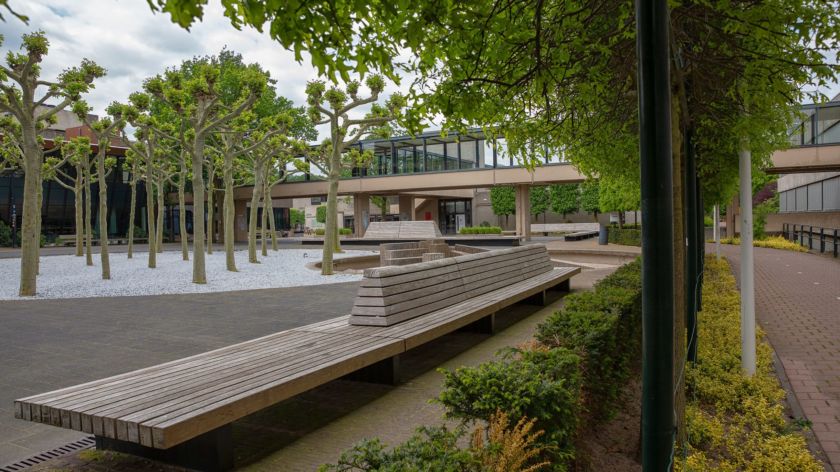‘Give students interactive web lectures. It is truly appreciated’
-
 Foto: Dick van Aalst
Foto: Dick van Aalst
OPINION - Economics student Koen Smeets would like to see lecturers put more effort into creating web lectures in which students play an active role: ‘This not only ensures interaction with students, but lecturers can also see if they understand what is being discussed.’ He also hopes that the university pays sufficient attention to loneliness during the coronavirus pandemic.
Two weeks ago, the Executive Board presented the plan for resuming activities. This shows that the capacity of the university is limited. The university’s largest lecture hall, located in the Grotius building, normally accommodates 482 students. At a safe distance for the coronavirus, this is reduced to only 48. There are also approximately ten halls that can accommodate more than twenty people.
The use of these halls will also be limited: the cabinet has decided that education may only begin outside rush-hour times (during the day between 11.00 a.m. and 3.00 p.m. and in the evening after 8.00 p.m.). However, there may be exceptions, which Radboud university medical center, the university, the HAN University of Applied Sciences, and the ROC are discussing with public transport companies. Either way, capacity is very limited.
Online Lectures
If large-scale lectures are not possible, what are the best alternatives? In my opinion, the best alternative is interactive web lectures. By this I mean online lectures in which the lecturers actively try to involve the students, such as through quizzes and short discussions. This not only ensures interaction with students, but lecturers can also see if they understand what is being discussed. Asking a small group of randomly selected students whether they want to turn on their webcam will not suffice, given the low quality of the average webcam.
For this reason, it’s not hard to imagine that some lecturers would prefer in-person education for a small group over online lectures. But the problem is that the level of involvement you would get in smaller groups is lost in larger online groups. The same applies to reusing ‘old’ web lectures that have been recorded in recent years.

Although I can understand why lecturers choose not to give interactive web lectures, I would like to encourage them to do so. To those lecturers who doubt whether students really appreciate this extra effort I would say: yes, for many students it really matters. I personally had good, interactive web lectures this term, for which I would like to thank my lecturers as well as all lecturers who put in so much time and effort. Unfortunately, I have also heard very different stories from fellow students.
In order to encourage lecturers to give good, interactive web lectures, the university has to lend a hand. It should provide support, resources, time, and compensation. Some examples of this are a good webcam and microphone, stable internet, ICT support, and (although probably difficult in budgetary terms) compensation for the additional hours needed for work such as adjusting PowerPoint presentations.
Tests
There is already a need for clear communication about what will be offered in person and digitally, especially for international students. Is it necessary for this group to come to the Netherlands? Should they start looking for a room and sign a contract, or can they participate in the education online from their own country? When tests are taken simultaneously in the smaller rooms at the university, it is possible to administer tests on campus. However, we can hardly expect the international students to come to the Netherlands just for this.
Students who are in the coronavirus risk group experience the same problem: are they expected to travel to campus to take the tests here? My proposal would be that when a test is taken in person, it should be possible for students to take this test online as well. Only when it really cannot be done otherwise — for example in the biomedical degree programmes — should a test only be offered on campus, but it is important to communicate this to students now.
‘How can we make sure that students stay motivated and do not get put under too much stress?’
Physical presence is also a dilemma for seminars, especially given the limited space available. Smaller seminars could be scheduled. However, it is important that, unless there really is no other option, these lectures are not compulsory, especially for the risk group and international students.
When choosing which students are allowed to come to the campus, the Executive Board wants to give priority to students in the first year of their Bachelor’s or Master’s degree programme. The plan shows that there are only 10 rooms for more than 20 students, 13 rooms for 15-20 students, and 26 rooms for 10-15 students. In combination with the limited lecture hours (lectures only outside of rush-hour times), this will mean that, in practice, there will be little or no physical classes for students who are already studying at the university. Although I understand that priority will be given to new students, I hope that seminars can also be organised for students who are already studying at the university.
Loneliness
What does not appear at all in the plan is the lack of motivation and the loneliness among students. I notice that for many students — including myself — these are problems that are caused by the absence of lectures and seminars. If large-scale lectures are not possible at all and project groups are only possible in a limited way for a longer period of time, this is something the Executive Board should also take into account in its plans. How can we make sure that students stay motivated and do not get put under too much stress and work pressure? How can we prevent students from feeling lonely without a bustling student life? How do we create a sense of togetherness among new students if they cannot meet in person? These are important questions without a simple answer, which do need to be discussed.
For the first question, it is important that lecturers, when assigning homework, reports, etc., take into account that the coronavirus pandemic also limits the time of students (especially those living away from home). For the second and third questions, we could consider ideas like small-scale physical or digital meetings.
My advice would be to provide lecturers with the means they need to ensure good, interactive web lectures and to also administer exams online, unless there is no other option. In addition, I hope that seminars can also be organised for students who are already studying. Finally, I think it is important to already consider how we can increase student motivation and prevent loneliness.
Koen Smeets is a second-year Economics student at Radboud University. He is also Outreach Coordinator at Rethinking Economics NL, an organisation dedicated to innovating economics education.



